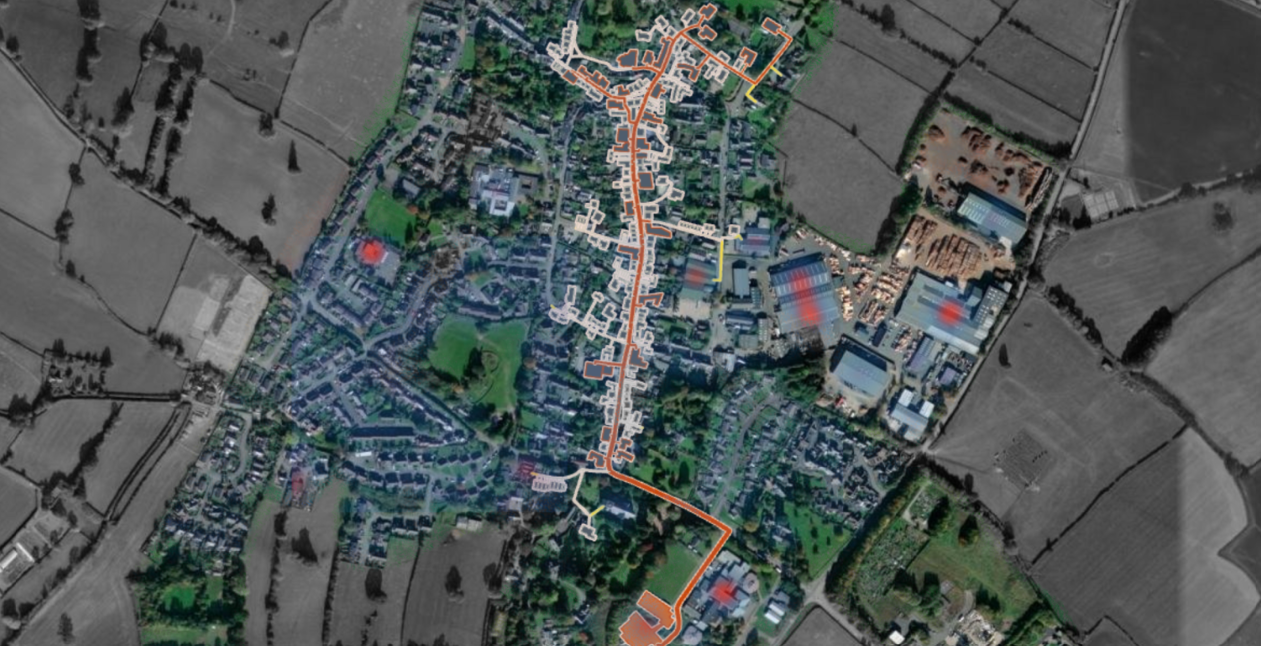The project is well underway with our Comparator Research phase now completed. We’ve taken a deep dive into over 130 existing heat networks across the UK and internationally which will be used to inform the initial concept design of the Community District Heat Network (CDHN) techo-economic model. Ben has written an extensive review focusing on both operational low-carbon heat networks which heat domestic properties and are on a community scale, and community led heat network projects which produced feasibility studies. We are commencing the first modelling phase of the CHDU project which involves developing a techno-economic model of CDHNs, which will then be used to perform a nationwide site search.
We’ve created an online forum in Loomio where we hope to provide opportunities for discussion and engagement with the wider heat network community – please see below for details of how to get involved.
Site visits
As part of our ongoing research, the team visited Rocks Green, an affordable housing development in Ludlow where an existing biomass district heat network with some initial reliability problems underwent extensive remedial work and now reliably provides heat to 91 homes. Thanks to Reheat and HVA Systems for facilitating this visit.
The team also visited Bishop’s Castle, where feasibility work has been carried out and funding secured for further development of a district heat network. Our visit included looking at potential locations for a proposed 1MW wind turbine and 500kW of solar PV that will help to power the heat network, and meeting with the Lightfoot project team.
We respond to the DESNZ consultation on heat network zones
As many of you will know, the Department for Energy Security and Net Zero (DESNZ) is deep into developing the Heat Network Transformation Programme. Following the passage of the Energy Bill last year a steady stream of consultations have been emitted as the government fleshes out its well-publicised ambition to expand the use of heat networks across the UK.
Whilst we of course support this ambition, we confess we naively thought this agenda would support our work. The recent consultation on heat network zoning shows that this may not be the case. The zoning regulations being consulted on would see heat network zones being declared and licensed by a competitive process, analogous to how licences are granted for oil and gas exploration. Will these processes deliver community benefit, or involve communities in any way? It’s fair to say we have concerns. Read the article on our website to see what we had to say.
Community Heat Network Forum
The discussion and knowledge sharing that took place at our launch event last year have been really valuable to us and we’d love to have further opportunities to engage with you. We’d really appreciate it if you could support our project with your expertise and advice by joining our Community Heat Development Unit forum on Loomio, where we hope to encourage open discussion and collaboration on our project and on community heat networks more generally. Our forum has been kindly set up by our project partners CEE as a sub-group of their CEE practitioners Loomio, of which many of you will already be members. To join the forum, please use the link below:
Other news
Bishop’s Castle Heat & Wind Project awarded substantial grant
Shrewsbury and Telford Community Energy in partnership with Lightfoot Enterprises have successfully applied to the Community Energy Fund, with £100,000 awarded towards the further development of the Bishop’s Castle Heat & Wind Project. Further details here.
CEE recruiting Heat and Retro-fit Co-ordinator
Community Energy England are recruiting for a Heat and Retrofit Co-ordinator to support community groups across the country (including this CHDU project!) developing projects in the areas of low carbon heat and energy efficiency. The full-time role is remote and/or based in Sheffield.
Funding opportunity for rural low carbon projects
Regen is working with National Grid Electricity Distribution on an innovation project focused on the decarbonisation of rural areas called REACH: Rural Energy and Community Heat. If your organisation represents a rural community that is interested in developing low carbon projects, including renewable generation, EV charging, energy storage, or low carbon heat, then Regen want to hear from you!
If you have any questions please contact gmiddlemiss@regen.co.uk.
